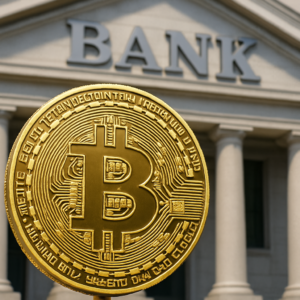The Federal Deposit Insurance Corporation (FDIC) of the U.S. has introduced new guidance that reshapes how banks interact with cryptocurrency-related activities. Under the revised policy, FDIC-supervised institutions can now engage in digital asset transactions without seeking agency approval. The groundbreaking shift eliminates previous restrictions, allowing financial institutions to collaborate with crypto firms and expand their services in the digital asset space.
Key Changes in FDIC Crypto Regulations
The updated guidance is outlined in Financial Institution Letter (FIL-7-2025). It rescinds a 2022 requirement requiring banks to notify the FDIC before engaging in cryptocurrency-related activities. With this regulatory shift, banks can freely explore crypto ventures while maintaining robust risk management protocols.

The move follows the recent release of 175 internal FDIC documents exposing past efforts to discourage banks from working with crypto businesses. The documents were disclosed through a Freedom of Information Act (FOIA) request by Coinbase. They revealed that the previous administration had actively pressured financial institutions to cut ties with digital asset firms.
Coinbase had sued the FDIC in 2024, alleging unfair practices that stifled crypto adoption in traditional banking. The newly disclosed records provide evidence of the FDIC instructing banks to suspend services to crypto-related businesses. Critics have dubbed this strategy “Operation Choke Point 2.0.”
How FDIC’s New Crypto Policy is Transforming Banking
The policy revision marks a significant step towards a more innovation-driven and crypto-friendly regulatory environment. Acting FDIC Chairman Travis Hill acknowledged the need for change, stating, “With today’s action, the FDIC is turning the page on the flawed approach of the past three years. I expect this to be one of several steps the FDIC will take to lay out a new framework for banks engaging in crypto and blockchain-related activities following safety and soundness standards.”
While the FDIC’s new stance offers greater flexibility for banks, it also reinforces the necessity of responsible risk management. Financial institutions must implement strong compliance measures to address risks associated with market volatility, regulatory challenges, and cybersecurity threats.

Crypto Regulation and Banking’s Future
Looking ahead, the FDIC has committed to working closely with the President’s Working Group on Digital Asset Markets. It will also collaborate with other regulatory bodies to establish clearer compliance guidelines for crypto-related banking activities.
The revised policy is expected to strengthen the relationship between traditional finance and the crypto sector. The shift could drive mainstream adoption of digital assets and expand their role in global banking services. With regulatory barriers lifting, banks have a prime opportunity to capitalise on the digital economy. The change unlocks new growth potential for financial institutions and accelerates cryptocurrency integration into traditional banking systems.
Stay informed,
Rodcas Consulting Group
